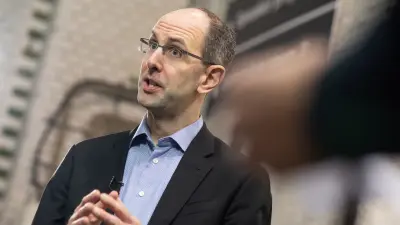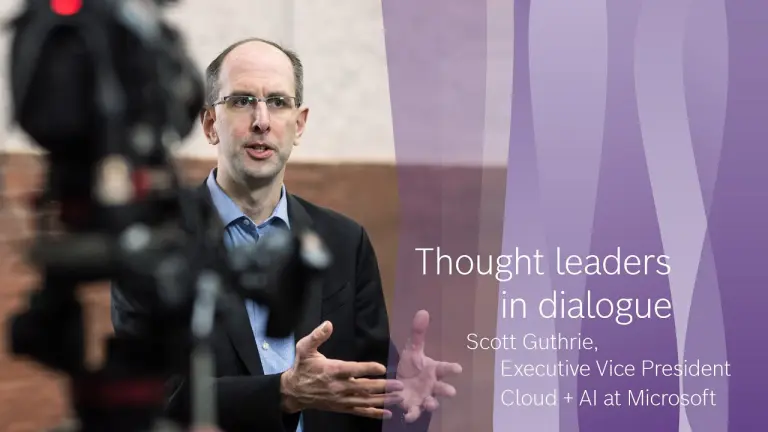Greater collaboration in Industry 4.0: the Open Manufacturing Platform
In dialogue with the Executive Vice President, Cloud + AI at Microsoft

2020-09-03
How can companies build digital industrial solutions more easily and scale? And how do they get the best out of their data? Scott Guthrie gives his take on these two pressing issues.
The problem with data silos
For manufacturing companies, digitization is both an opportunity and a challenge. Once devices and machines leverage the Internet of Things (IoT) to orchestrate, businesses can analyze and manage relevant data in the cloud to turn business-critical insights into concrete actions. Today however, bringing those legacy and proprietary systems to the cloud is challenging, often resulting in proprietary data silos, making the collaboration across teams and organizations more complex.
One platform for everyone
To address this challenge, Microsoft and the BMW Group founded the Open Manufacturing Platform (OMP) in 2019. OMP is an alliance to help manufacturing companies accelerate innovation at scale through cross-industry collaboration, knowledge and data sharing as well as access to new technologies. Earlier in 2020, Anheuser-Busch InBev (AbInBev), the Bosch Group and ZF Friedrichshafen AG joined OMP as steering committee members. The OMP supports other alliances, including the OPC Foundation and Plattform Industrie 4.0, and leverages existing industry standards, open source reference architectures and common data models.

Scott Guthrie, Executive Vice President Cloud + AI at Microsoft considers cloud, AI and IoT technologies as key drivers to help the industry transform and grow: “Cloud computing allows you to take very large amounts of data and turn them into critical business insights that help you optimize operations, ensure industrial equipment performance, improve worker’s safety and increase productivity across your supply chain.”
“The Open Manufacturing Platform empowers manufacturing companies to innovate at scale.”
Achieving more together
The special thing about the Opening Manufacturing Platform is the fact it is an open approach that focuses on collaboration. Manufacturers and suppliers from a variety of sectors can join the initiative and share their experiences, data models, and Industry 4.0 solutions with the other members. “With OMP, we empower manufacturing organizations to innovate at scale,” says Guthrie. The OMP is designed to enable companies to leverage the potential of their data with greater ease and provide value to their customers faster. Every member ultimately benefits.
The biggest question when it comes to data processing: cloud or edge?

Edge computing is one of the hottest trends in digitization at the moment. It allows for data processing ‘on the edge’ across things — from machines to the end device. IT experts are currently debating whether edge technology will ultimately replace the cloud. Supporters argue that edge is more secure and faster when it comes to processing real-time data. Guthrie advocates the best of both worlds: “You achieve the best results when you integrate your cloud and edge efforts. With the cloud you can take vast amounts of data, you can train AI and build AI models using that data. And the beauty about the intelligent edge is that you can take these AI models and push them down closer to your machines, closer to your workers, and the assembly lines.” The cloud is more efficient than an architecture made up of a number of edge devices in terms of processing larger datasets.
“The combination of cloud and edge computing enables a faster time to business insights and therefore business value.”
An IoT partnership that is looking to the future
Working on the Open Manufacturing Platform is not the first time Bosch and Microsoft have collaborated. Last year, the two companies entered into a strategic partnership to help manufacturing companies enrich their industry solutions with mixed reality. The term refers to the combination of real world (augmented reality) and virtual objects (virtual reality) that users can interact with using a mixed reality headset such as Microsoft HoloLens. Bosch has also developed the Common Augmented Reality Platform (CAP). This solution enables mixed and augmented reality applications to be created for training purposes and industrial applications, such as remote maintenance.
Bosch was one of the first companies to test Microsoft HoloLens 2 before the market launch in order to equip the product with CAP functionalities. “We have a strong partnership across our engineering efforts and cultural values,” says Guthrie. The industrial Internet of Things will take on ever-greater importance over the next few years. Guthrie emphasizes that “the convergence of Bosch’s industry experience and Microsoft’s technology expertise will help our customers grow and achieve more.”
An interview with Scott Guthrie, Executive Vice President Cloud + AI at Microsoft

Loading the video requires your consent. If you agree by clicking on the Play icon, the video will load and data will be transmitted to Google as well as information will be accessed and stored by Google on your device. Google may be able to link these data or information with existing data.
Profile

Scott Guthrie, 45
Executive Vice President Cloud + AI at Microsoft
The OMP open collaboration approach will help manufacturing companies bring solutions to market faster, with increased scale and greater efficiency.
As Executive Vice President Cloud + AI at Microsoft, Scott Guthrie is responsible for the company’s computing fabric (cloud and edge, including cloud infrastructure, server, database, CRM, ERP, management) and artificial intelligence platform. Prior to his position as Executive Vice President Cloud + AI at Microsoft, Guthrie helped lead Microsoft Azure, Microsoft’s public cloud platform. Since joining the company in 1997, he has made critical contributions to many of Microsoft’s key cloud, server and development technologies and was one of the original founders of the .NET project. Guthrie graduated with a bachelor’s degree in computer science from Duke University.
Summary
The Open Manufacturing Platform (OMP) is an alliance to help manufacturing companies accelerate innovation at scale through cross-industry collaboration, knowledge and data sharing as well as access to new technologies. Scott Guthrie believes that companies across industries will benefit most if they integrate cloud and edge capabilities and is committed to grow Microsoft’s longstanding partnership with Bosch.


